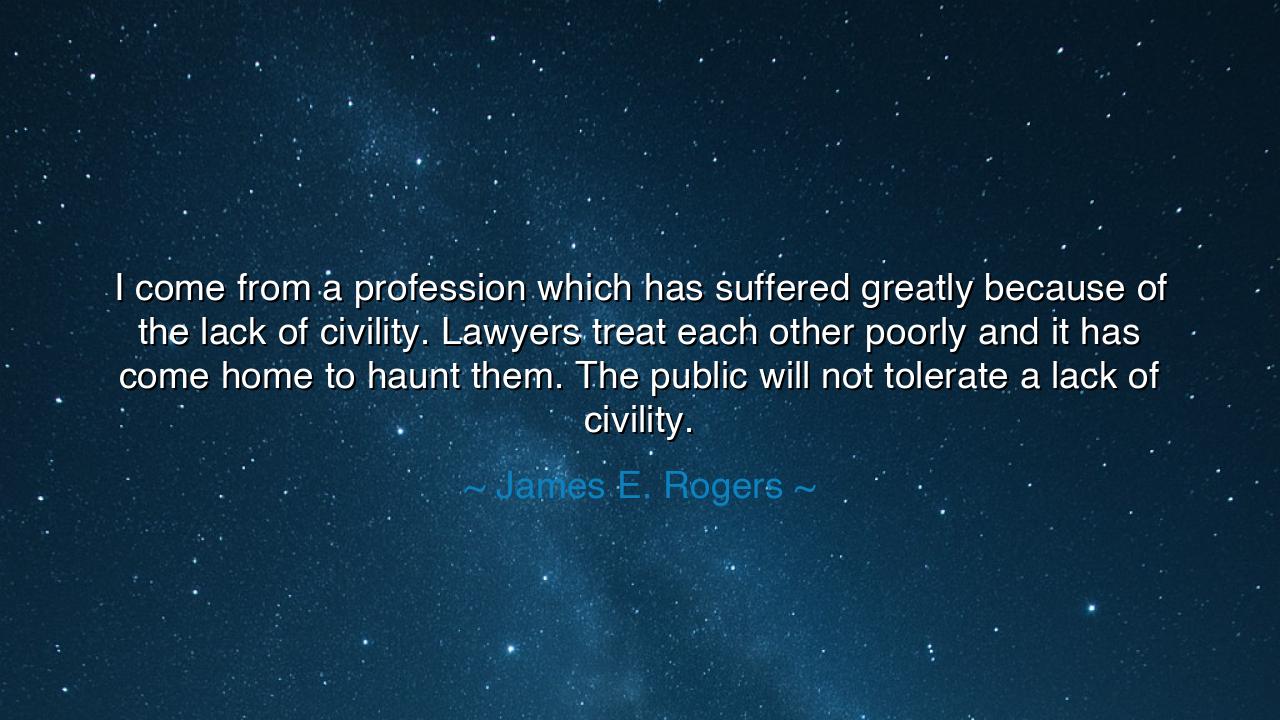
I come from a profession which has suffered greatly because of
I come from a profession which has suffered greatly because of the lack of civility. Lawyers treat each other poorly and it has come home to haunt them. The public will not tolerate a lack of civility.






Hear, O seekers of justice, the solemn warning of James E. Rogers, who declared: “I come from a profession which has suffered greatly because of the lack of civility. Lawyers treat each other poorly and it has come home to haunt them. The public will not tolerate a lack of civility.” These words, though spoken of the legal craft, strike at the heart of all human dealings. For when courtesy is abandoned and respect cast aside, even the noblest profession becomes tarnished, and trust—the foundation of law and of society—crumbles into dust.
The meaning of this utterance is profound. A lawyer’s profession is built upon advocacy, argument, and contention, yet it cannot survive if those elements devolve into cruelty, hostility, and scorn. To disagree in reason is healthy; to despise in manner is poison. Rogers reminds us that when lawyers treat each other with disdain, they not only wound their peers but also erode the dignity of their calling. The courtroom, which should stand as a temple of justice, risks becoming a marketplace of insults and gamesmanship. And when this occurs, the public, whose faith sustains the profession, withdraws its trust.
The ancients knew well the power of civility. In the Agora of Athens, debates raged fiercely, but even amidst disagreement, the concept of respect for the opponent’s humanity endured. Cicero, master of Roman oratory, often opposed his rivals with great intensity, yet he reminded his fellow advocates that persuasion dies when cruelty prevails, for the audience turns not to the truth of the argument but to the ugliness of the speaker. So too in modern times: Rogers warns that the public—those who watch, listen, and depend upon the law—will not long abide a profession that devours itself with incivility.
Consider the fall of public trust during the Watergate scandal. Lawyers, entrusted with the highest responsibilities of governance, engaged in deception, hostility, and the manipulation of law for power. Their lack of civility, both to the law and to each other, bred disgust in the people, who demanded reform and transparency. It was not merely the crimes that angered the nation, but the tone of arrogance and contempt with which they were carried out. Here history shows that Rogers speaks true: a profession without civility soon faces public wrath.
Yet his words are also a call to renewal. For civility does not mean weakness, nor does respect mean surrender. One may advocate fiercely while honoring the dignity of one’s adversary. Indeed, true strength of argument shines most brightly when it is delivered with calm, with patience, and with courtesy. The lawyer who maintains civility in the heat of conflict demonstrates mastery, not only of law but of self. And such mastery wins the respect not only of opponents but of the public, who long for justice tempered by humanity.
The lesson is plain: in all our dealings—whether as lawyers, as leaders, as citizens, or as family—we must guard the treasure of civility. For without it, reason collapses into rage, and persuasion into noise. The power of civility is not merely in soft words, but in the recognition of shared humanity, even amidst division. If we lose this, we lose the trust upon which all community depends.
Therefore, O listener, take Rogers’ words into your heart. Whether you contend in courts, in debates, or in daily life, hold fast to civility. Speak firmly, yet with respect; argue passionately, yet with dignity; confront wrong, yet without cruelty. For in doing so, you preserve not only your own honor but also the faith of those who watch and listen.
So let his words echo as both warning and guide: “The public will not tolerate a lack of civility.” In this truth lies the path forward. For if justice is to endure, it must be clothed not only in law but in respect, not only in reason but in humanity.






AAdministratorAdministrator
Welcome, honored guests. Please leave a comment, we will respond soon